
Reading & Resources
School Administrator, June 2018
Book Reviews
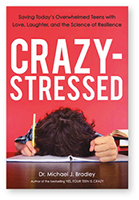 Crazy-Stressed: Saving Today’s Overwhelmed Teens with Love, Laughter, and the Science of Resilience
Crazy-Stressed: Saving Today’s Overwhelmed Teens with Love, Laughter, and the Science of Resilience
by Michael J. Bradley, AMACOM Books, New York, N.Y., 2017, 288 pp. with index, $17.95 softcover
Michael J. Bradley, author of
Crazy-Stressed, is a noted expert on adolescent behavior and is also the author of
Yes, Your Teen is Crazy. He is a family counselor certified in the treatment of substance abuse disorders by the American College of Professional Psychology and has been seen in the national media, including “Today” and “Good Morning America.”
Being a teenager is hard. Being the parent of a teenager is hard. Teens today have high rates of anxiety, depression and substance abuse. Suicide is a very real danger. Bradley writes in down-to-earth language and the chapters are peppered with illustrative, realistic examples of teen behavior and teen-parent situations. Readers may feel like they know the author personally. His writing style builds rapport with the reader. In fact, Bradley mentions his own experience with parenting a teenager – and admits it can be infuriating, uplifting and terrifying.
The book is organized in three sections – background, strategies, and common parenting challenges with handy do’s and don’ts. The do’s and don’ts in Part III are in checklist form, easy to read and remember, and cover topics like bullying, dating, school issues and sleep.
This terrific book speaks primarily to parents, although middle and high school counselors and administrators would also find it useful. It would be a great pick for a school counselor who desires to lead a book study for parents. It is fresh, real and helpful.
Reviewed by Marilyn King, deputy superintendent for instruction, Bozeman Public Schools, Bozeman, Mont.
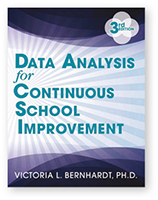 Data Analysis for Continuous School Improvement, 4th Edition
Data Analysis for Continuous School Improvement, 4th Edition
by Victoria L. Bernhardt, Routledge, New York, N.Y., 2018, 414 pp, with index, $49.95 softcover
In
Data Analysis for Continuous School Improvement, author Victoria L. Bernhardt provides a framework for data-driven decision-making that, when implemented effectively, will lead to continuous school improvement. She provides the reader with tools, protocols, examples and strategies for using multiple measures of data. Demographics, perceptions, student learning and school process measures are discussed in detail. When these measures are used on a regular basis, the results clearly document trends and provide information that assist schools in determining next steps for improvement.
The author shows how to analyze, report, communicate and use multiple measures of data. This book is useful to education leaders in implementing a data-driven approach to school improvement. This well-organized and structured book provides a framework for school comprehensive improvement.
In today’s world, schools are being held accountable for the learning of every child. As educational leaders, we must learn how to design and implement a data-driven instructional system so we can facilitate sustained, measurable learning on the part of all students. This book is an excellent resource to assist school improvement teams in this effort.
Reviewed by Diane E. Reed, associate professor and director, Graduate Educational Leadership Program, St. Fisher College, Rochester N.Y.
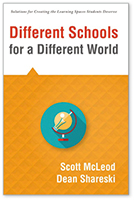 Different Schools for a Different World: School Improvement for 21st Century Skills, Global Citizenship, and Deeper Learning
Different Schools for a Different World: School Improvement for 21st Century Skills, Global Citizenship, and Deeper Learning
by Scott McLeod and
Dean Shareski, Solution Tree Press, Bloomington, Ind., 2018, 53 pp. with index, $17.95 softcover
A short book – a strong message! With the pressure building on schools to re-examine instructional methods and revamp curriculum offerings to better prepare students for the different world they will be experiencing in their not-so-distant future, ideas for school significant school improvement are desperately needed.
Different Schools for a Different World has several ideas worth considering.
Authors Scott McLeod and Dean Shareski share a strong background in educational technology and in leading and supporting transformational practices in teaching and learning. Their book is one in the “Solutions for Creating the Learning Spaces Students Deserve” series, which features short, reader-friendly books that challenge traditional practices while encouraging educators to question their beliefs about how students can learn most effectively.
Each of this book’s core chapters addresses one of the arguments confronting school change: information literacy; economics; learning; boredom; innovation; and equity. Each argument is presented with coherent rationale, then concluded with practical steps and strategies that school administrators, staffs and boards can take to address their own situations.
This book should be considered a primer and not a panacea. The problems presented are formidable, but the authors cite places where successful confrontations are occurring. The ideas presented in this text are inspiring even though they will provoke controversy. School change must start somewhere, sometime. This book is one place to look for ways to start now.
Reviewed by John C. Fagan, retired superintendent, Oak Park, Ill.
 The Inspiration Code: How the Best Leaders Energize People Every Day
The Inspiration Code: How the Best Leaders Energize People Every Day
by Kristi Hedges, AMACOM, New York, N.Y., 2017, 254 pp. with index, $24.95 hardcover
A spark is all it takes to inspire. Kristi Hedges brings her expertise in coaching staff in Fortune 500 companies to bear in
The Inspiration Code to help readers understand how important inspiration is to every organization. With a methodology she calls “The Inspire Path,” Hedges provides a blueprint for every leader to use. Filled with extensive research, interviews with leaders and survey data, her work is truly an inspiration.
For superintendents, she provides steps to prepare your own brand. There’s plenty of practical advice and doable steps to help leaders set up interactions that will make a difference. Hedges breaks down every element of the communication process and explains why it matters.
Reviewed by Kenneth E. Hoover, retired superintendent and co-author of
The Superintendent and the CFO: Building an Effective Team
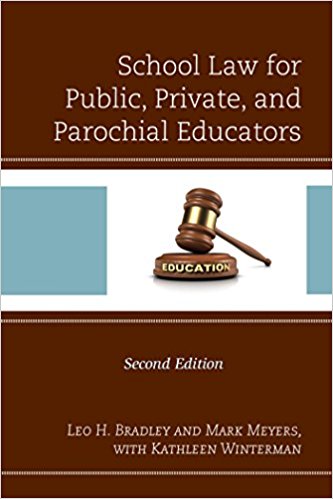 School Law for Public, Private, and Parochial Educators, Second Edition
School Law for Public, Private, and Parochial Educators, Second Edition
by Leo H. Bradley and
Mark Meyers, Rowan & Littlefield, Lanham, Md., 2017, 298 pp. with index, $49.95 softcover
School Law for Public, Private, and Parochial Educators is best suited for a graduate-level law course. Leo Bradley is a former superintendent who now serves as a professor at Xavier University while Mark Meyers is a former dean who is a professor at Xavier and president of the Ohio Association of Private Colleges of Education.
The book provides case summaries at the end of most of its 12 chapters and includes briefs, ramifications and topics of interest. It is a concise presentation of the statutory and case law knowledge necessary for administrators in their day-to-day operation of charter, private and parochial schools.
The Church and State chapter was particularly comprehensive and discussed how many of the bricks regarding separation of church and state have been gradually removed. The important cases were summarized at the end of the chapter, which helped the reader select pertinent cases for further study. The Students’ Rights Chapter was also comprehensive in providing important cases, except the FERPA section, which needed more explanation and guidance.
While the authors' intent in writing the book was for the information contained to be a quick reference for educators, it would have been more effective to include scenarios and explanations at the end of each chapter to ensure a comprehensive understanding of the concepts discussed.
The book is nicely written, contains the important cases with each topic and is a useful tool. Readers can pick and choose chapters to read depending on the issue of interest. It is difficult to address individual state laws and perhaps would be more relevant if it had listed important state laws for a particular state, such as Ohio.
Reviewed by Paul A. Shaw, director of educator ethics, Georgia Professional Standards Commission, Atlanta, Ga.
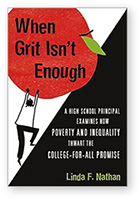 When Grit Isn’t Enough: A High School Principal Examines How Poverty and Inequality Thwart the College-For-All Promise
When Grit Isn’t Enough: A High School Principal Examines How Poverty and Inequality Thwart the College-For-All Promise
by Linda F. Nathan, Beacon Press, Boston, Mass., 2017, 167 pp., $26.95 hardcover
In a time when so many communities are made up of low socio-economic families and the children in them are living in poverty, high schools must be held accountable to educate students on more than academics.
Colleges and universities must take responsibility to get these same young adults into college and keep them there. Linda Nathan, author of
When Grit Isn’t Enough: A High School Principal Examines How Poverty and Inequality Thwart the College-For-All Promise, hits the reader early on with a realistic picture of the dangers we, as a society, face if this issue is not taken seriously.
Nathan states, “if we do not educate all of our students to high levels, we endanger our democracy. However, if we are regularly denying access to a certain segment of our population, specifically poor and people of color, how can our democratic structures survive?”
Five phrases that students commonly hear regarding how to get into college or life successfully tell the tale in this book: (1) “Money doesn’t have to be an obstacle;” (2) “Race doesn’t matter;” (3) “Just work harder;” (4) “Everyone can go to college;” and (5) “If you believe, your dreams will come true.” Nathan, a former school headmaster, gives real-life examples as to why these phrases are not the reality for so many of our students. She lets the reader know that students need much more than a cheerleading section yelling “rah, rah, you can do it!”
Through candid conversations with her former students, the author discusses how working harder and believing dreams come true is not what these kids, from different financial and cultural backgrounds, need; their needs go way beyond grit.
A to-the-point and concise read, Nathan reminds us that there are no cookie cutter ways to successfully prepare young adults for college. Our youth don’t all come from the same socio-economic background, race or culture, so why wouldn’t high schools and/or colleges and universities do a better job at preparing students for what they’ll face — the realities of what to expect as a college student?
Reviewed by Priscilla A. Boerger, chair, department of education, Regis College, Weston, Mass.
Why I Wrote this Book ...
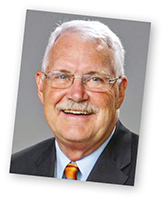
“As superintendent, it was challenging to find a book that I could expect my leadership team to read and prepare for an intensive book study. This team was already pushing the 24/7 sound barrier with after-school activities, night-time community events and board meetings. So I decided to write this book to be a quick read yet thought-provoking, with a focus on the nuances of school leadership — a book you could read in two hours with takeaway lessons.”
Nicholas I. Clement, endowed professor of practice, Northern Arizona University, Flagstaff, Ariz., and AASA member since 1998, on writing
Raise the Bar & Then … (Teachers Change Brains Media, 2018)
ABSTRACT
Homegrown Leaders
Being a rural, homegrown and transformational leader can help overcome geographic challenges, according to a doctoral study by Dorian Dawn Olsen at the University of Iowa.
The 2017 qualitative case study included interviews of two principals in neighboring Midwestern states. The research found the participants’ prior history and relationships within their districts and communities allowed them to gain trust, create a positive school culture and effect change.
Olsen suggested this information provides insight to principal preparation and can help rural superintendents as they hire new principals.
Copies of “Homegrown Rural School Leaders” are accessible from ProQuest at 800-521-0600 or
disspub@proquest.com.
BITS & PIECES
Mental Health Services
A study in the
Journal of the American Academy of Child and Adolescent Psychiatry found that school-based services from teachers and other school-based professionals can help reduce mental health problems in elementary students.
Implementing interventions multiple times a week was found to be more than twice as effective as those implemented only on a weekly or less-frequent basis.
Youth Activism
YouthInFront is a new community-created online learning resource aimed at a generation of young people who are considering participating in their first political action or protest.
The website was formed after the creators conducted surveys and interviews. The site answers questions such as “Why protest?” “Will I get in trouble?” and “How can teachers be allies?”
Education Statistics
The “
Digest of Education Statistics,” a new comprehensive statistical reference for all levels of education, has been released by the National Center for Education Statistics.
Data cover an array of topics, including the number of schools and colleges, teachers, enrollments and graduates. Updated statistical tables are released on a rolling basis.
School Communication
School Communication that Works offers school leaders ways to develop messages to patrons and taxpayers.
The book, written by National School Public Relations Association member Ken DeSieghardt, covers topics such as performance of principals, district promises made and fulfilled and what patrons say they want and need in a crisis.
Teacher Reform
A
new survey from the Education Week Resource Center found 44 percent of teachers reported they considered leaving teaching because of evaluations, new curriculum implementations or new professional development.
Eighty-six percent of the teachers surveyed had experienced some form of education reform in the previous two years. Most respondents claimed once they adopted a new reform, it was replaced, forcing them to learn another.
School Calendars
“
Resources for Planning the School Calendar 2018-19” is now available from the National School Public Relations Association.
Designed for complete planning, the guide provides historical dates, cultural and ethnic holidays, federal holidays and a listing of national education conferences through 2023.
Rural Advocacy
AASA has co-produced a report with the Rural School and Community Trust titled “
Leveling the Playing Field for Rural Students.”
The 11-page document used Hancock County, Tenn., as an instructive example for how federal resources can lift the educational experience for those in school.
AASA Collaborative
The
AASA Collaborative for Innovation and Transformational Leadership is a small, national network that seeks like-minded education leaders to learn together, support one another, document communities of practice and advocate for policies that transform school systems.